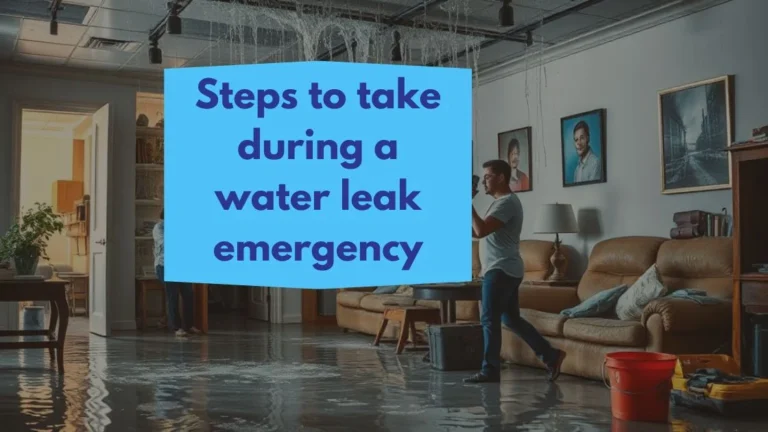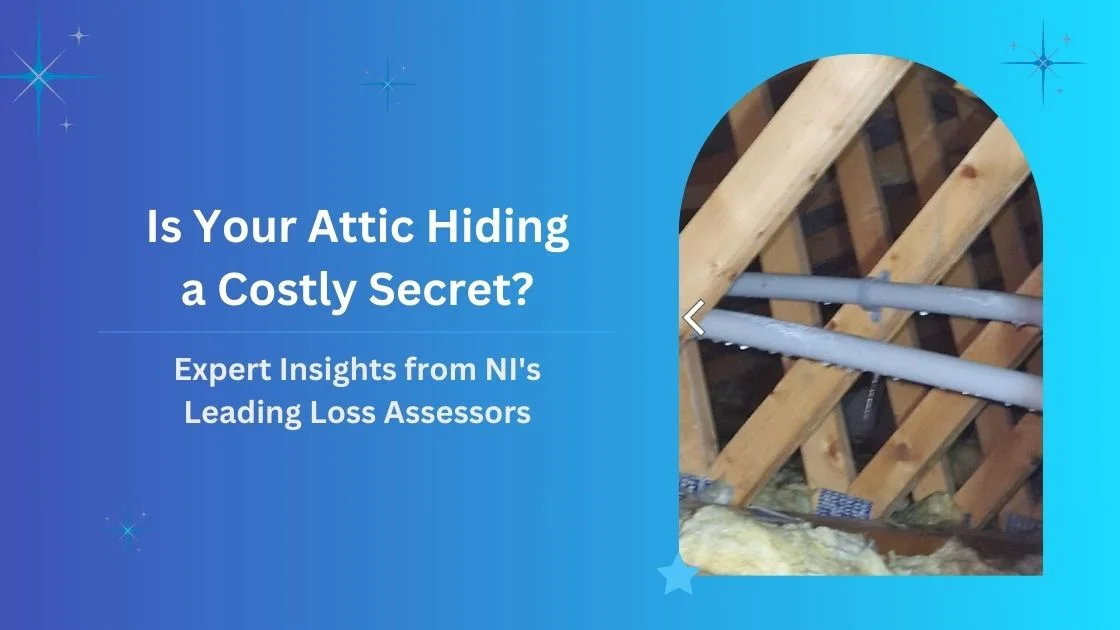When a water leak emergency strikes, quick and decisive action is crucial to minimise damage and prevent further complications. Knowing the right questions to ask can guide your response and ensure that you tackle the situation effectively.
In this article, we’ll highlight the essential questions you should address during a water leak emergency. From identifying the source to understanding the extent of the damage, these questions will help you manage the crisis efficiently and protect your property from lasting harm.
In a water leak emergency, prioritise immediate actions while addressing essential questions.
- Identify visible signs such as damp patches or unusual sounds, and ensure safety by turning off the main water supply and disconnecting electrical devices.
- Determine the leak’s source through a thorough visual inspection of pipes and surrounding areas.
- Manage standing water promptly to prevent mould growth and structural damage.
- Evaluate your insurance coverage to understand potential claims and repairs.
- Engaging qualified professionals can facilitate effective resolution.
Recognising Signs of a Leak
Water leaks can quietly wreak havoc on your home, often going unnoticed until significant damage occurs. Effective leak detection begins with vigilance.
Look for standing water in different areas, which often signals a plumbing issue. Moreover, observe for damp patches on floors, ceilings, or walls, indicating moisture intrusion from hidden leaks.
Listen for any dripping or hissing sounds emanating from behind walls, as these can reveal underlying pipe problems. Warped wooden flooring is another critical sign, suggesting prolonged exposure to moisture.
Ultimately, monitor your water bill for unexplained increases, as this may point to excessive water usage due to a leak. Conducting a thorough moisture assessment can help safeguard your home and foster a sense of belonging in a secure environment.
Immediate Actions to Take
Quick action is required to reduce potential damage caused by a water leak.
- Begin by turning off the main water supply to prevent further leakage, a critical step in emergency preparedness.
- Next, release water pressure by running a tap until the flow ceases, ensuring that any residual water in the pipes is drained.
- For home safety, disconnect all electrical devices in the affected areas to eliminate the risk of electrocution.
- Identify the room with the leak to facilitate focused action and inform any professionals you may need to call.
- Prioritise your safety by avoiding contact with both water and electrical sources, as this can lead to hazardous conditions that compromise your well-being and property.
Learn what other immediate actions you can take if you have a water leak emergency.
Identifying the Leak Source
Identifying the source of a water leak is essential for effective remediation.
Begin with a thorough visual inspection of accessible pipes, as this often reveals the most apparent issues.
For more elusive leaks, engaging professional services equipped with advanced detection technology can provide precise insights into concealed problems.
Visual Inspection Techniques
A thorough visual inspection is critical in pinpointing the source of a water leak, as many issues can manifest in both obvious and subtle ways.
Begin by checking visible areas for leaks, particularly under sinks, around toilets, and near appliances. These spots are common culprits in water damage scenarios.
Next, inspect ceilings and walls for damp patches or discolouration, which can indicate hidden leaks requiring moisture assessment.
Furthermore, look for warped flooring, especially near water sources, as it may signal infiltration beneath.
Pay attention to unusual sounds like dripping, suggesting active leaks.
Document your findings with photographs and notes to aid in future leak detection efforts, especially if professional assistance or insurance claims become necessary.
Engaging Professional Services
Many homeowners may find themselves overwhelmed when faced with the complexities of locating a water leak, especially when the source is not immediately apparent.
Employing professional services can greatly ease this burden, as these experts use advanced technology, such as thermal imaging and acoustic sensors, to accurately identify hidden leaks. The precision of an expert evaluation not only guarantees fast detection but also prevents potential exacerbation of the issue.
After locating the leak, hiring a qualified plumber is essential for effective repairs and compliance with plumbing regulations. Moreover, documenting findings from these services can support future insurance claims.
Many leak detection companies offer free assessments, allowing homeowners to explore options without immediate financial pressure, fostering a sense of community support during this stressful time.
Related: How to choose a Leak Detection Expert.
Managing Standing Water
Standing water poses a significant threat to both residential and commercial properties, making timely management imperative.
To minimise damage, quickly absorb excess water using sponges and towels, as prolonged exposure can lead to mould growth and structural deterioration.
For larger volumes of standing water, employ buckets to safely collect and prevent further spread.
It is essential to wear protective gear, such as gloves and boots, when handling potentially contaminated water to ensure your safety.
Prompt action is critical; delays can result in extensive damage that may necessitate professional remediation services.
If the standing water is substantial or unmanageable, consider engaging professional water extraction services to safeguard your property and restore a safe environment.
Insurance and Repair Considerations
Understanding the intricacies of your insurance policy is essential when managing the aftermath of a water leak.
It’s important to assess coverage for water damage and promptly file claims for necessary repairs to alleviate financial strains.
Furthermore, exploring repair options with qualified professionals can ensure that restoration is handled correctly, safeguarding your investment and future claims.
Recommendation: Hire an independent Loss Assessor to manage your water damage claim.
Coverage of Water Damage
Water damage coverage is a crucial aspect of any homeowner’s insurance policy, as it can significantly impact the financial and structural integrity of a property.
It is essential to thoroughly review your policy to identify any coverage exclusions or limitations regarding water leaks. Some policies may impose specific restrictions that could leave you vulnerable to substantial repair costs.
If your current insurance does not adequately protect against potential water damage, consider obtaining additional coverage.
Furthermore, documenting all damages and repairs with photographs and receipts is important for supporting future claims.
Understanding policy limits and potential leak allowances can also provide peace of mind, ensuring you’re prepared for unexpected challenges related to water damage.
Claiming Repair Costs
When dealing with the aftermath of a water leak, navigating the claims process can be intimidating yet essential for recovering repair costs. Understanding your insurance coverage and maintaining thorough claim documentation is vital. Promptly notifying your insurer and meticulously documenting damages can expedite reimbursement.
| Action | Importance |
|---|---|
| Review your insurance policy | Determine coverage for water damage |
| Document all damages | Support your insurance claim |
| Notify your insurer promptly | Comply with policy requirements |
| Track communication | Establish a clear claims record |
Consider specialised water leak insurance for added protection if you reside in areas prone to such issues. This proactive approach can help mitigate stress and financial burdens during recovery.
Repair Options Available
Addressing the aftermath of a water leak requires careful consideration of repair options and associated insurance implications.
Initially, review your insurance policy to confirm coverage for water leak damage, as many standard home insurance policies include relevant provisions. If you are insured, meticulously document all damages and repairs to support your claim, thereby reducing out-of-pocket expenses.
For those in leak-prone areas, consider obtaining specialised water leak insurance for added financial security.
Engage a qualified plumber for repairs, as improper DIY attempts may exacerbate the issue and jeopardise your insurance claim.
Ultimately, prioritise using high-quality repair materials for effective repairs, and refrain from restoring the water supply until all necessary work is completed to ensure robust leak prevention moving forward.
Seeking Professional Help
In the event of a water leak emergency, swift action is crucial. Engaging a licensed plumber ensures that the situation is assessed and repaired by a professional, preventing further damage.
Consider the following steps:
- Ask if there are free leak detection services offered by local water companies.
- Determine whether the leak involves utility mains or internal pipes.
- Verify the plumber’s credentials and insurance to ensure compliance with safe drinking water standards.
- Document all communications and actions taken regarding the leak.
- Prioritise a timely response to minimise damage and costs.
Key Takeaways
- Identify and assess visual and auditory signs of a leak, such as damp patches, standing water, or unusual sounds.
- Immediately turn off the main water supply to prevent further damage and disconnect electrical devices in affected areas for safety.
- Conduct a thorough inspection of accessible pipes and areas to locate the source of the leak, documenting findings for reference.
- Review your insurance policy for water damage coverage and file claims promptly, maintaining detailed documentation of the incident and repairs.
- Engage professional plumbers for repairs and utilise community resources for leak detection assistance, ensuring timely and effective intervention.
Worried about an emergency water leak damaging your property?
Northern Ireland’s top Leak Detection Company is here to protect you from costly surprises!
Imagine the damage an emergency leak could cause—skyrocketing bills, structural issues, and mould growth. Our expert team uses cutting-edge technology to locate leaks quickly and accurately, saving you from unnecessary stress and expense.
Trust Northern Ireland’s leading leak detection specialists to keep your property safe and secure.
Don’t wait until it’s too late! Contact PCLA today to schedule your leak assessment.



